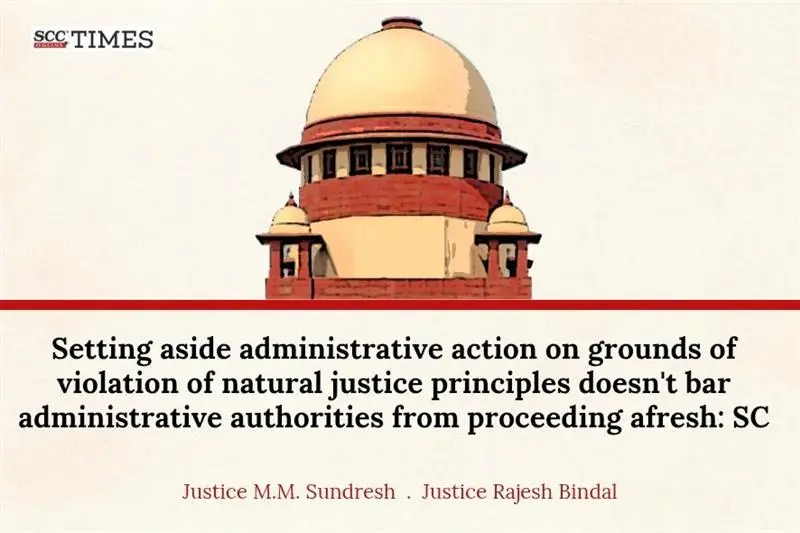Supreme Court: While considering the instant appeal wherein the issue pertained to the nature and scope of administrative actions initiated in pursuance of the Master Directions on Frauds — Classification and Reporting by commercial banks and select FIs, dated 01-07-2016 (‘Master Directions’) vis-à-vis criminal proceedings initiated, against the respondents; the Division Bench of M.M. Sundresh* and Rajesh Bindal, JJ., clarified that there is an apparent distinction between the two. While the former (Master Directions) is within the domain of the RBI and the Complainant-Banks; the latter (criminal proceedings) is within the domain of the Appellant-CBI.
The Court further pointed out that the administrative actions initiated in pursuance of the RBI’s Master Directions were set aside only on the ground of nonadherence to the principle of Audi Alteram Partem and not on merits. Setting aside of an administrative action on the grounds of violation of the principles of natural justice does not bar the administrative authorities from proceeding afresh.
Background:
The Reserve Bank of India issued the Master Directions, which were formulated with the objective of providing a framework for banks, to enable early detection and reporting of frauds, and consequently taking actions in a timely manner. In view of the same, the Appellant-Banks initiated administrative actions that affected the respondents, by declaring the companies’ bank accounts as fraudulent — an action which had significant civil consequences delineated in the Master Directions. The Appellant-Banks also initiated criminal proceedings against the respondents, with respect to fraudulent activity that was detected, as the Master Directions require the Banks to refer certain categories of cases to the State Police or the Central Bureau of Investigation as a general rule.
Aggrieved by the same, the respondents approached different jurisdictional High Courts, challenging the validity of the Master Directions, and the actions taken consequently. The High Courts via impugned orders quashed not only the administrative actions initiated in pursuance of the Master Directions, but also the FIRs registered, and the subsequent criminal proceedings initiated against the respondents. The High Court quashed the administrative actions ground of non-adherence to the principles of natural justice, more specifically the principle of Audi Alteram Partem, as the respondents were not given an opportunity of being heard before the companies’ bank accounts were declared as fraudulent/blacklisted.
The High Courts consequently quashed the criminal proceedings initiated against the respondents, holding that they are a natural corollary to the administrative action of declaring the aforementioned bank accounts as fraudulent.
Counsel for the CBI contended that High Courts ought not to have equated the administrative actions initiated in pursuance of the Master Directions with the criminal proceedings. A civil or an administrative action stands on a different footing in comparison to a criminal proceeding.
Per contra, the respondents’ counsel argued that criminal proceedings were a consequence of the administrative actions initiated in pursuance of the Master Directions issued by the RBI. Hence, the High Courts were right in quashing the FIRs and the subsequent criminal proceedings.
Court’s Assessment:
Perusing the matter, the Court stated that that an administrative action and a criminal proceeding stand on different footings, as clarified in para 39 of State Bank of India v. Rajesh Agarwal, (2023) 6 SCC 1.
The Court said that a FIR, which takes cognizance of an offence, merely sets the law into motion, which has nothing to do with a decision on the administrative side, made by a different authority. Merely because the facts are same or similar, one cannot say that in the absence of a valid administrative action, no offence which is otherwise cognizable, can be registered. Therefore, even assuming that there is no action forthcoming on the administrative side, an FIR can be held to be maintainable. The scope and role of both the actions are totally different and distinct, more so when undertaken by different statutory/public authorities.
Even in a case where an FIR is registered based on an administrative action, setting aside the latter on a technical or a legal premise would not ipso facto nullify the former. It is ultimately a matter for investigation by the appropriate authority. When an administrative order is set aside on the ground of non-compliance of a legal necessity or mandate, the facts mentioned thereunder could still be the basis for the registration of an FIR. Hence, the High Courts had clearly failed to take note of the same.
The Court pointed out that the High Courts quashed the FIRs and the subsequent criminal proceedings on an erroneous interpretation of Rajesh Agarwal case (supra). Relying on this very case, the Supreme Court pointed out that the principles of natural justice are not applicable at the stage of reporting a criminal offence. Providing an opportunity of being heard prior to the commencement of a criminal action (i.e. registration of an FIR), would frustrate the very purpose of initiating a criminal proceeding, which is to meet the ends of justice.
The Court thus expressed agreement with the stand taken by the Appellants that the High Courts exceeded their jurisdiction by quashing the FIRs and the subsequent criminal proceedings, despite no challenge being made to the same.
Vis-a-vis the administrative actions, the Court clarified that there is no bar on the RBI or the Banks to proceed afresh, by adhering to the principles of natural justice.
Decision:
The Court classified the batch of appeals into 5 following categories, for the sake of convenience to give clarity with respect to the outcome of each appeal:
FIR challenged and set aside by the High Court: The Court set aside the impugned judgments and remit the matters in their original form to the High Court for fresh consideration on all issues, except the one issue which has been decided by the Court in these appeals.
FIR not challenged but still set aside by the High Court: The Court set aside the impugned judgments and granted a period of two weeks, from the date of passing the instant judgment, for the concerned respondents to resort to appropriate remedies in a manner known to law.
Interim Orders: for cases where interim order have been passed, the same will continue till the disposal of the petition being remitted to the High Court.
For cases where interim orders have not been passed, no coercive steps shall be taken against the respondents for a period of 2 weeks from the date of passing of the instant judgment.
Status of Investigation:
Where investigation is ongoing, and is to Continue, there, no coercive steps shall be taken against the respondents/accused.
Where investigation qua the respondents/Accused is complete, there is no necessity to take coercive steps or arrest the concerned respondents/Accused.
CBI not added as a party — respondent before the High Court: The Court directed that CBI be impleaded before the High Court by way of a suo motu order being passed by this Court, since these matters are being remitted for fresh consideration.
CASE DETAILS
|
Citation: Appellants : Respondents : |
Advocates who appeared in this case For Petitioner(s): For Respondent(s): |
CORAM :








